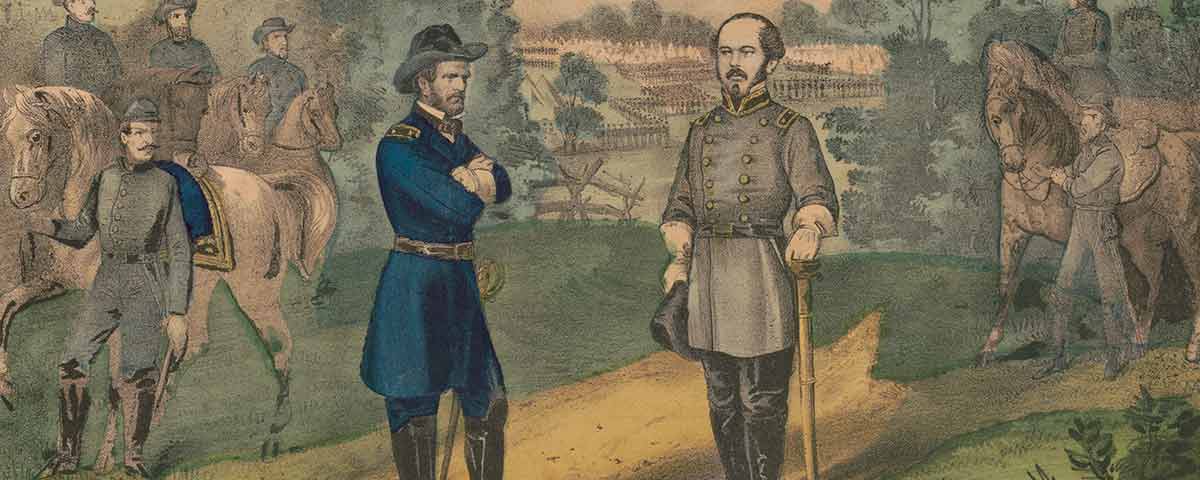April 18, 1865
Memorandum or basis of agreement made this 18th day of April, A.D. 1865, near Durham’s Station, in the State of North Carolina, by and between General Joseph E. Johnston, commanding the Confederate army, and Maj. Gen. William T. Sherman, commanding the army of the United States in North Carolina, both present.
First. The contending armies now in the field to maintain the status quo until notice is given by the commanding general of any one to its opponent, and reasonable time, say forty-eight hours, allowed.
Second. The Confederate armies now in existence to be disbanded and conducted to their several State capitals, there to deposit their arms and public property in the State arsenal, and each officer and man to execute and file an agreement to cease from acts of war and to abide the action of both State and Federal authority. The number of arms and munitions of war to be reported to the Chief of Ordnance at Washington City, subject to the future action of the Congress of the United States, and in the meantime to be used solely to maintain peace and order within the borders of the States, respectively.
Third. The recognition by the Executive of the United States of the several State governments of their officers and legislatures taking the oaths prescribed by the Constitution of the United States, and where conflicting State governments have resulted from the war the legitimacy of all shall be submitted to the Supreme Court of the United States.
Fourth. The re-establishment of all the Federal courts in the several States, with powers as defined by the Constitution and laws of Congress.
Fifth. The people and inhabitants of all the States to be guaranteed, so far as the Executive can, their political rights and franchises, as well as their rights of person and property, as defined by the Constitution of the United States and of the States, respectively.
Sixth. The Executive authority of the Government of the United States not to disturb any of the people by reason of the late war so long as they live in peace and quiet, abstain from acts of armed hostility, and obey the laws in existence at the place of their residence.
Seventh. In general terms, the war to cease, a general amnesty, so far as the Executive of the United States can command, on condition of the disbandment of the Confederate armies, the distribution of the arms, and the resumption of peaceful pursuits by the officers and men hitherto composing said armies.
Note being fully empowered by our respective principals to fulfill these terms, we individually and officially pledge ourselves to promptly obtain the necessary authority and to carry out the above programme.
W.T. SHERMAN,
Major-General, Comdg. Army United States in North Carolina.
J.E. JOHNSTON,
General, Commanding C.S. Army in North Carolina.
April 26, 1865
Terms of a military convention entered into this 26th day of April, 1865, at Bennett’s house, near Durham’s Station, N.C., between General Joseph E. Johnston, commanding the Confederate Army, and Maj. Gen. W.T. Sherman, commanding the United States Army in North Carolina.
1. All acts of war on the part of the troops under General Johnston’s command to cease from this date.
2. All arms and public property to be deposited at Greensborough, and delivered to an ordnance officer of the United States Army.
3. Rolls of all the officers and men to be made in duplicate, one copy to be retained by the commander of the troops, and the other to be given to an officer to be designated by General Sherman, each officer and man to give his individual obligation in writing not to take up arms against the Government of the United States until properly released from this obligation.
4. The side-arms of officers and their private horses and baggage to be retained by them.
5. This being done, all the officers and men will be permitted to return to their homes, not to be disturbed by the United States authorities so long as they observe their obligation and the laws in force where they may reside.
J.E. JOHNSTON,
General, Commanding C.S. Forces in North Carolina.
W.T. SHERMAN,
Major-General, Commanding U.S. Forces in North Carolina
RALEIGH, N.C., April 26, 1865
Approved:
U.S. GRANT,
Lieutenant-General
Military Convention of April 26, 1865.
Supplementary terms
First. The Confederate troops to retain their transportation.
Second. Each brigade or separate body to retain a number of arms equal to one-seventh of its effective total, which, when the troops reach their homes, will be received by the local authorities for public purposes.
Third. Officers and men to be released from their obligation at the same time with those of the Army of Virginia.
Fourth. Artillery horses to be used for field transportation when necessary.
Fifth. The horses and other private property of officers and men to be retained by them.
Sixth. Troops from Arkansas and Texas to be transported by water from Mobile or New Orleans to their homes by the United States.
Seventh. The obligations of private soldiers to be signed by their company officers.
Eighth. Naval officers within the limits of General Johnston’s command to have the benefit of the stipulations of this convention.





